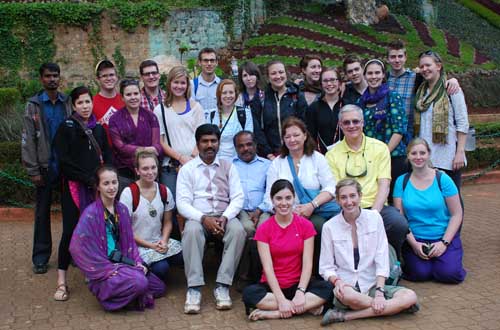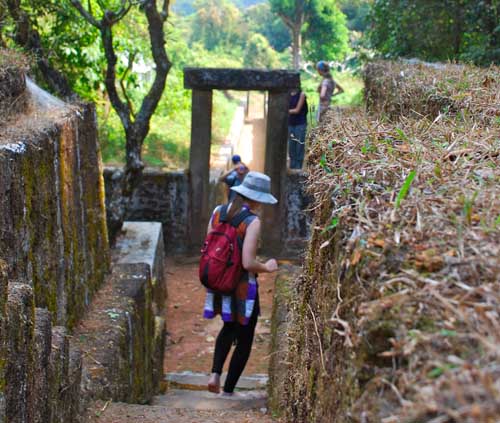Travel Notes by Erin Stefaniuk

This winter, 25 students and two faculty members are travelling through India under the University’s semester-abroad program offered by U of G’s Centre for International Programs. The group is spending four months travelling and studying in one of the world’s most diverse countries, one steeped in tradition and culture.
“The rich tapestry of culture and history that exists in India, as well as the vitality of the Indian people, presents a wonderful backdrop,” says Prof. Cynthia Scott-Dupree, School of Environmental Sciences (SES). She is using part of her research leave to help lead the India semester, a long-time dream.
“India is a country in transition, and it’s amazing to be able to witness the changes first-hand. Everyone at the University will be pleased to know that there is a fabulous group of young people representing U of G in India this semester.”
The senior undergrads in India this year come from diverse programs: international development, political science, history, adult development and well-being, environmental science, anthropology, agriculture, geography, psychology, economics and French.

This is the third India semester since 2008 for co-ordinator and SES professor Chris Hall. Besides broadening his own view of teaching and outreach, he says the experience will make a difference for students. “These young people are dedicated to making lasting contributions to society, which in my opinion is one of the key outcomes of a university education.”
By early February, the group had visited numerous destinations, including Chennai, Pondicherry, Coimbatore and a rainforest retreat in the Western Ghat mountains. Their entire trip will take them from Mysore in southern India to Jaipur in the north, with study sessions in both places.
In-class sessions began in late January. Before that, the students immersed themselves in Indian culture and daily life, including taking local transportation and sampling local foods. Besides a lack of infrastructure and law enforcement, the country poses challenges, including issues of gender, caste and religion – not to mention traveller’s sickness.
In Coimbatore, the students visited Tamil Nadu University, one of the country’s top universities and world-renowned for its agriculture studies. Researchers there collaborate with the University of Guelph and with the Canadian International Development Agency on agricultural extension programs in local communities. Through e-learning, researchers connect with farmers to share efficient farming techniques and information.
In the mountain village of Ooty, the students visited a horticultural research station connected to Tamil Nadu University. Here researchers study fermentation of organic fertilizer and use of medicinal plants, working with 100 local farmers to improve crop productivity.
The students will visit about 10 non-governmental organizations (NGOs) working on various local issues. In Turtle Bay, FSL India installs toilets in neighbouring fishing villages and along the beach, where lack of facilities raises health and gender problems. Only three years in, the project has improved the lives of villagers, especially women. The Guelph group donated $400 to the NGO, enough to build one toilet.
At the Rainforest Retreat at Mojo Plantation in Karnataka state, the group learned about organic crop production, rainforest biodiversity, balanced ecosystems, and natural farming and production. The students helped to harvest vanilla beans, coffee beans and tea leaves on the plantation while learning about organic cultivation and biological pest control.

At a village school, the Guelph group learned about challenges facing children from farm families, including isolation, long treks between school and home, and conflicts between attending school and working on the farm.
By sharing songs, dances, gifts and information, the visitors and the children glimpsed each other’s culture, says Erin Stefaniuk, a Guelph student in international development and history. “Spending time with them may have been a small act, but these moments are reminders of the blessings of travelling to India and experiencing another culture,” she said. “They invoke thoughts and ideas about issues in India and how they relate to similar ones back in Canada. It is through these travelling experiences that we find ideas to make positive changes to our world.”
Offered since 1995, the India semester is one of several semester-abroad programs run by U of G.